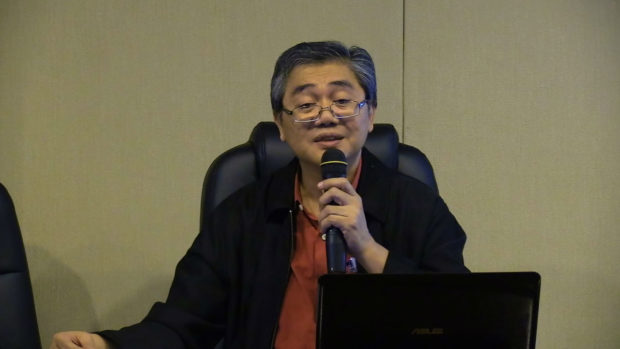
Consultative Committee (Con-com) spokesperson Ding Generoso. (Photo by CATHY MIRANDA / INQUIRER.net)
Members of the consultative committee, which drafted a new Constitution, rebuked the government’s economic managers for painting a bleak picture of the planned shift to federalism without doing their job of helping craft the proposed Charter in the first place.
In recent days, President Rodrigo Duterte’s economic team, led by Finance Secretary Carlos Dominguez III, said the shift to the federal system under the draft charter could lead to massive spending cuts, layoffs of up to 95 percent of public sector employees, a bigger budget deficit and a downgrade in the country’s credit ratings.
“We need to know how they arrived at these figures? What assumptions were made based on the provisions of the draft Constitution?” consultative committee spokesperson Ding Generoso said on Saturday.
“We might have different assumptions—because our computations do not reflect the figures cited by [the] Department of Finance (DOF),” he said.
Committee member and San Beda Graduate School of Law dean Fr. Ranhilio Aquino indicated that Dominguez and others in the President’s economic team only gave half-hearted support to the charter deliberations where their concerns could have been tackled.
Repeatedly invited
“Let everyone know that during the sessions of the [committee], Secretary Dominguez was invited repeatedly but he chose not to appear, dispatching instead his underlings who could not or would not provide helpful answers. He should have raised his issues and made his suggestions then,” the law dean said in a Facebook post on Friday.
Executive Order No. 10, which created the committee, “directed” all government entities, agencies and instrumentalities “to render assistance for the committee to carry out its mandate.”
Arturo Aguilar, the only economist and businessman in the committee, said: “It would have been great to hear [these apprehensions from the economic managers] when we were drafting the fiscal provisions.”
“We got no help from the economic managers in spite of formal letters. In one hearing, undersecretaries of [the] DOF, DBM (Department of Budget and Management) and Neda (National Economic and Development Authority) showed up. We asked for data and advice. They never came back,” said Aguilar, who chaired the committee’s economic reforms and fiscal administration group.
Experts outside gov’t
Because there was no help from the economic managers, Aguilar said fellow committee member Prof. Edmund Tayao had to consult public finance experts outside the government and the academe in coming up with the recommendations on tax sharing provisions in the draft charter.
The draft constitution proposes the creation of a federal intergovernment commission with the country’s economic managers as members, according to Aguilar.
“They will be running the show. So what are they talking about when they will be the ones in charge of the transition? They will be the ones who will determine the pace of the transition,” he said.
Several senators, however, said the administration should not ignore the warning from its own economic managers.
“Instead of outrightly rejecting it, it should encourage more critical and intellectual discussions to level up the debate on federalism,” Sen. Joel Villanueva said.
Sen. Francis Pangilinan, who chairs the Senate Committee on Constitutional Amendments, was particularly worried about the possible loss of jobs for 95 percent of the national government’s 1.46 million employees, or about 1.387 million people.
The job losses would be “too much a price to pay for charter change, as proposed,” he said.
Pimentel: Nothing to fear
Sen. Aquilino Pimentel III, a supporter of federalism, dismissed such fears.
“Nobody will be unemployed,” he said in a radio interview on Saturday. “There will be those who will move from the national government to the regional government.”
He said infrastructure projects would also continue under the proposed regional governments.
Deficits, he added, should not be raised as an issue against the shift to federalism because the country had them even under the current unitary system.
“What I’m getting from [the economic managers] is that they need more information. So the con-com (consultative committee), which still exists, should give the data being asked for,” he said.
Malacañang was not alarmed by the opinions of the economic managers on the draft Constitution.
“As we have said, we encourage a healthy discussion regarding the draft federal Constitution,” presidential spokesperson Harry Roque said in a statement on Saturday. —Reports from Jerome Aning, Leila B. Salaverria, Christine O. Avendaño and Carla P. Gomez